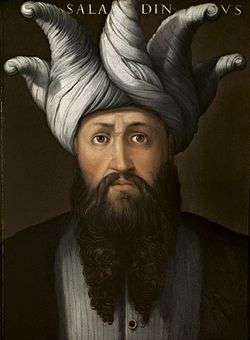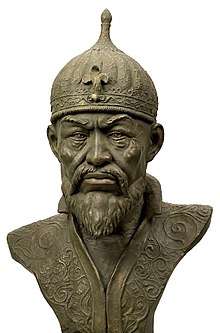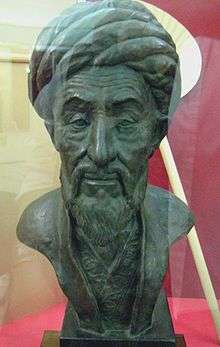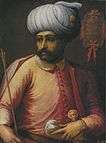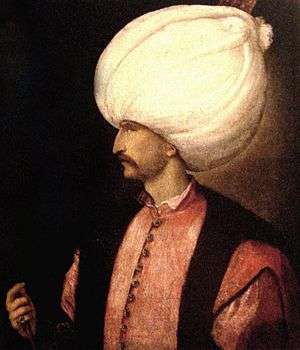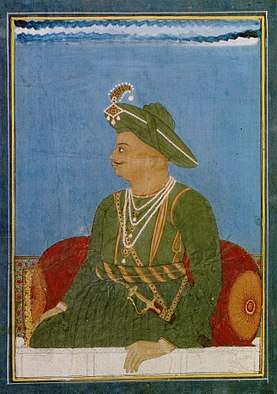Mujaddid
A mujaddid (Arabic: مجدد), is an Islamic term for one who brings "renewal" (تجديد tajdid) to the religion.[3][4] According to the popular Muslim tradition, it refers to a person who appears at the turn of every century of the Islamic calendar to revive Islam, cleansing it of extraneous elements and restoring it to its pristine purity. In contemporary times, a mujaddid is looked upon as the greatest Muslim of a century.[5]


The concept is based on a hadith (a saying of Islamic prophet Muhammad),[6] recorded by Abu Dawood, narrated by Abu Hurairah who mentioned that Prophet Muhammad said:
Allah will raise for this community at the end of every 100 years the one who will renovate its religion for it.
Ikhtilaf (disagreements) exist among different hadith viewers. Scholars such as Al-Dhahabi and Ibn Hajar al-Asqalani have interpreted that the term mujaddid can also be understood as plural, thus referring to a group of people.[8][9]
Mujaddids can include prominent scholars, pious rulers and military commanders.[4]
List of claimants and potential mujaddids

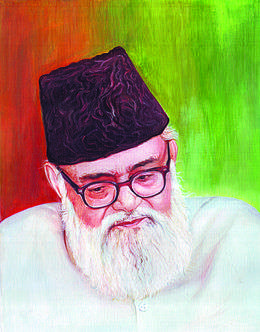
While there is no formal mechanism for designating a mujaddid in Sunni Islam, there is often a popular consensus. The Shia and Ahmadiyya[16][17] have their own list of mujaddids.[4]
Second Century (August 10, 815)
Third Century (August 17, 912)
- Muhammad al-Bukhari (810–870)[1]
- Abu al-Hasan al-Ash'ari (874–936)[20][23]
Fourth Century (August 24, 1009)
- Abu Bakr Al-Baqillani (950–1013)[19][24]
- Hakim al-Nishaburi (933–1012)[1]
Fifth Century (September 1, 1106)
Sixth Century (September 9, 1203)
- Salauddin Ayyubi (1137–1193)[30]
- Fakhr al-Din al-Razi (1149–1210)[31]
- Muhammad bin Bakhtiyar Khalji (1206)[32][33]
Seventh Century (September 5, 1300)
- Ibn Taymiyyah (1263–1328)[34]
Eighth Century (September 23, 1397)
- Ibn Qayyim al-Jawziyya (1292–1350)[35]
- Tamerlane (Timur) (1336–1405)[36]
- Ibn Hajar al-Asqalani (1372–1448)[37]
Ninth Century (October 1, 1494)
Tenth Century (October 19, 1591)
- Selim I (1470-1520)[41]
- Suleiman the Magnificent (1494-1566)[42]
- Ahmad Sirhindi (1564–1624)[23][43]
- Abdullah ibn Alawi al-Haddad (1634–1720)[44]
Eleventh Century (October 26, 1688)
- Mulla Sadra Shirazi (1571–1640)[45][46]
- Khayr al-Din al-Ramli (1585–1671)[18]
Mahiuddin Aurangzeb Alamgir (1618-1707)[47]
Twelfth Century (November 4, 1785)
- Shah Waliullah Dehlawi (1703–1762)[48]
- Muhammad ibn Abd al-Wahhab (1703–1792)[49]
- Murtaḍá al-Zabīdī (1732–1790)[38]
- Shah Abdul Aziz Delhwi (1745–1823)[50]
- Usman Dan Fodio (1754–1817)[51]
- Tipu Sultan (1750–1799)[52]
Thirteenth Century (November 14, 1882)
- Muhammad Abduh (1849–1905)[21]
- Said Nursî (1878–1960)[53]
- Syed Ahmad Khan (1817–1898)[54]
Fourteenth Century (November 21, 1979)
- Mirza Ghulam Ahmad (1835–1908)[55][56][nb 1]
- Abul A'la Maududi (1903-1979)[15]
- Muhammad Nasiruddin al-Albani (1914-1999)[60]
Notes
References
- Waliullah, Shah. Izalatul Khafa'an Khilafatul Khulafa. p. 77, part 7.
- Mohammed M. I. Ghaly, "Writings on Disability in Islam: The 16th Century Polemic on Ibn Fahd's "al-Nukat al-Ziraf"," The Arab Studies Journal, Vol. 13/14, No. 2/1 (Fall 2005/Spring 2006), p. 26, note 98
- Faruqi, Burhan Ahmad. The Mujaddid's Conception of Tawhid. p. 7. Retrieved 31 December 2014.
- Meri, Josef W. (ed.). Medieval Islamic Civilization: An Encyclopedia. Psychology Press. p. 678.
- "Mujaddid - Oxford Islamic Studies Online". www.oxfordislamicstudies.com. Retrieved 2018-09-03.
- Neal Robinson (2013), Islam: A Concise Introduction, Routledge, ISBN 978-0878402243, Chapter 7, pp. 85-89
- Sunan Abu Dawood, 37:4278
- Fath al-Baari (13/295)
- Taareekh al-Islam (23/180)
- Jackson, Roy (2010). Mawlana Mawdudi and Political Islam: Authority and the Islamic State. Routledge. ISBN 9781136950360.
- B. N. Pande (1996). Aurangzeb and Tipu Sultan: Evaluation of Their Religious Policies. University of Michigan. ISBN 9788185220383.
- Advocate of Dialogue: Fethullah Gulen by Ali Unal and Alphonse Williams, 10 June 2000; ISBN 978-0970437013
- Akgunduz, Ahmed; Ozturk, Said (2011). Ottoman History - Misperceptions and Truths. IUR Press. p. 14. ISBN 978-90-90-26108-9. Retrieved 28 December 2019.
- Hassan Ahmed Ibrahim, "An Overview of al-Sadiq al-Madhi's Islamic Discourse." Taken from The Blackwell Companion to Contemporary Islamic Thought, p. 172. Ed. Ibrahim Abu-Rabi'. Hoboken: Wiley-Blackwell, 2008. ISBN 978-1-4051-7848-8
- Mawdudi and the Making of Islamic Revivalism. Oxford University Press.
- "Religion in Southeast Asia: An Encyclopedia of Faiths and Cultures". ABC-CLIO, LLC.
- Jesudas M. Athyal, Religion in Southeast Asia: An Encyclopedia of Faiths and Cultures, (ABC-CLIO, LLC 2015), p 1. ISBN 9781610692496.
- "Mujaddid Ulema". Living Islam.
- Josef W. Meri, Medieval Islamic Civilization: An Encyclopedia, (Routledge 1 Dec 2005), p 678. ISBN 0415966906.
- Waines, David (2003). An Introduction to Islam. Cambridge University Press. p. 210. ISBN 0521539064.
- Nieuwenhuijze, C.A.O.van (1997). Paradise Lost: Reflections on the Struggle for Authenticity in the Middle East. p. 24. ISBN 90 04 10672 3.
- Mohammed M. I. Ghaly, "Writings on Disability in Islam: The 16th Century Polemic on Ibn Fahd's "al-Nukat al-Ziraf"," The Arab Studies Journal, Vol. 13/14, No. 2/1 (Fall 2005/Spring 2006), p. 26, note 98
- Josef W. Meri, Medieval Islamic Civilization: An Encyclopedia, (Routledge 1 Dec 2005), p 678. ISBN 0415966906
- Ihya Ulum Ad Din, Dar Al Minhaj: Volume 1. p. 403.
- The Legal Thought of Jalāl Al-Din Al-Suyūṭī: Authority and Legacy, Page 133 Rebecca Skreslet Hernandez
- "Imam Ghazali: The Sun of the Fifth Century Hujjat al-Islam". The Pen. February 1, 2011.
- Jane I. Smith, Islam in America, p 36. ISBN 0231519990
- Dhahabi, Siyar, 4.566
- Willard Gurdon Oxtoby, Oxford University Press, 1996, p 421
- Advocate of Dialogue: Fethullah Gulen by Ali Unal and Alphonse Williams, 10 June 2000; ISBN 978-0970437013
- "al-Razi, Fakhr al-Din (1149-1209)". Muslim Philosophy.
- Sufi Movements in Eastern India - Page 194
- The preaching of Islam: a history of the propagation of the Muslim faith By Sir Thomas Walker Arnold, pp. 227-228
- The Legal Thought of Jalāl Al-Din Al-Suyūṭī: Authority and Legacy, Page 133 Rebecca Skreslet Hernandez
- The Legal Thought of Jalāl Al-Din Al-Suyūṭī: Authority and Legacy, Page 133 Rebecca Skreslet Hernandez
- Hassan Ahmed Ibrahim, "An Overview of al-Sadiq al-Madhi's Islamic Discourse." Taken from The Blackwell Companion to Contemporary Islamic Thought, p. 214. Ed. Ibrahim Abu-Rabi'. Hoboken: Wiley-Blackwell, 2008. ISBN 978-1-4051-7848-8
- "Ibn Hajar Al-Asqalani". Hanafi.co.uk. Archived from the original on 2004-09-02.
- Azra, Azyumardi (2004). The Origins of Islamic Reformism in Southeast Asia part of the ASAA Southeast Asia Publications Series. University of Hawaii Press. p. 18. ISBN 9780824828486.
- Hassan Ahmed Ibrahim, "An Overview of al-Sadiq al-Madhi's Islamic Discourse." Taken from The Blackwell Companion to Contemporary Islamic Thought, p. 172. Ed. Ibrahim Abu-Rabi'. Hoboken: Wiley-Blackwell, 2008. ISBN 978-1-4051-7848-8
- Advocate of Dialogue: Fethullah Gulen by Ali Unal and Alphonse Williams, 10 June 2000; ISBN 978-0970437013
- Akgunduz, Ahmed; Ozturk, Said (2011). Ottoman History - Misperceptions and Truths. IUR Press. p. 14. ISBN 978-90-90-26108-9. Retrieved 28 December 2019.
- Transactions of the Royal Historical Society: Volume 12: Sixth Series By Royal Historical Society
- Glasse, Cyril (1997). The New Encyclopedia of Islam. AltaMira Press. p. 432. ISBN 90 04 10672 3.
- "A Short Biographical Sketch of Mawlana al-Haddad". Iqra Islamic Publications. Archived from the original on 2011-05-27.
- The Concise Encyclopedia of Islam - Page 286
- The Fundamental Principles of Mulla Sadra's Transcendent Philosophy by Reza Akbarian
- Kunju, Saifudheen (2012). "Shah Waliullah al-Dehlawi: Thoughts and Contributions": 1. Retrieved 5 April 2015. Cite journal requires
|journal=(help) - Kunju, Saifudheen (2012). "Shah Waliullah al-Dehlawi: Thoughts and Contributions": 1. Retrieved 5 April 2015. Cite journal requires
|journal=(help) - Nawaf E. Obaid (September 1999). "The Power of Saudi Arabia's Islamic Leaders". Middle East Quarterly. VI (3): 51–58. Archived from the original on 6 August 2011. Retrieved 23 June 2011.
- "Gyarwee Sharif". al-mukhtar books. Archived from the original on 2012-04-26.
- O. Hunwick, John (1995). African And Islamic Revival in Sudanic Africa: A Journal of Historical Sources. p. 6.
- Muslims and India's freedom movement, Shan Muhammad, Institute of Objective Studies (New Delhi, India), Institute of Objective Studies and the University of Michigan]], 2002; 9788185220581
- Rippin, Andrew. Muslims: Their Religious Beliefs and Practices. p. 282.
- Encyclopedia of Islam and the Muslim World, Thompson Gale (2004)
- Adil Hussain Khan, From Sufism to Ahmadiyya: A Muslim Minority Movement in South Asia, Indiana University Press, 6 April 2015, p. 42.
- Friedmann, Yohanan (2003). Prophecy Continuous: Aspects of Ahmadi Religious Thought and Its Medieval Background. Oxford University Press. p. 107. ISBN 965-264-014-X.
- "Ahmadis - Oxford Islamic Studies Online". www.oxfordislamicstudies.com. Retrieved 2018-09-03.
Controversial messianic movement founded by Mirza Ghulam Ahmad in Qadian, Punjab (British-controlled India), in 1889. Founder claimed to be a “nonlegislating” prophet (thus not in opposition to the mainstream belief in the finality of Muhammad 's “legislative” prophecy) with a divine mandate for the revival and renewal of Islam ... Rejected by the majority of Muslims as heretical since the Ahmadis believes in ongoing prophethood after the death of Prophet Muhammad.
- "The Ahmadiyyah Movement - Islamic Studies - Oxford Bibliographies - obo". Retrieved 2018-09-03.
- "Ghulam Ahmad, Mirza - Oxford Islamic Studies Online". www.oxfordislamicstudies.com. Retrieved 2018-09-08.
Founder of Ahmadi movement in Punjab, India, in 1889... The movement is labeled non-Muslim and fiercely opposed by Muslims, although the group considers itself Muslim.
- Joas Wagemakers (2016). Salafism in Jordan: Political Islam in a Quietist Community. Cambridge University Press. p. 43. ISBN 9781107163669.
Further reading
- Alvi, Sajida S. "The Mujaddid and Tajdīd Traditions in the Indian Subcontinent: An Historical Overview" ("Hindistan’da Mucaddid ve Tacdîd geleneği: Tarihî bir bakış"). Journal of Turkish Studies 18 (1994): 1–15.
- Friedmann, Yohanan. "Shaykh Ahmad Sirhindi: An Outline of His Thought and a Study of His Image in the Eyes of Posterity". Oxford India Paperbacks
